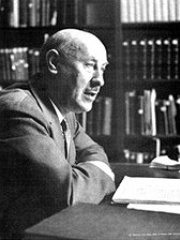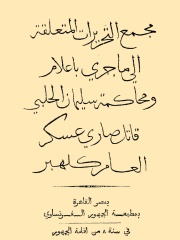







The Most Famous
HISTORIANS from Egypt
This page contains a list of the greatest Egyptian Historians. The pantheon dataset contains 561 Historians, 9 of which were born in Egypt. This makes Egypt the birth place of the 10th most number of Historians behind Poland, and Greece.
Top 9
The following people are considered by Pantheon to be the most legendary Egyptian Historians of all time. This list of famous Egyptian Historians is sorted by HPI (Historical Popularity Index), a metric that aggregates information on a biography's online popularity.

1. Manetho (201 BC - 160 BC)
With an HPI of 75.91, Manetho is the most famous Egyptian Historian. His biography has been translated into 59 different languages on wikipedia.
Manetho (; Koine Greek: Μανέθων Manéthōn, gen.: Μανέθωνος, fl. 290–260 BCE) was an Egyptian priest of the Ptolemaic Kingdom who lived in the early third century BCE, at the very beginning of the Hellenistic period. Little is certain about his life. He is known today as the author of a history of Egypt in Greek called the Aegyptiaca (History of Egypt), written during the reign of Ptolemy I Soter or Ptolemy II Philadelphus (285–246 BCE). None of Manetho’s original texts have survived; they are lost literary works, known only from fragments transmitted by later authors of classical and late antiquity. The remaining fragments of the Aegyptiaca continue to be a singular resource for delineating Egyptian chronology, more than two millennia since its composition. Until the decipherment of Ancient Egyptian scripts in the early 19th century CE, Manetho's fragments were an essential source for understanding Egyptian history. His work remains of unique importance in Egyptology.

2. Eric Hobsbawm (1917 - 2012)
With an HPI of 73.44, Eric Hobsbawm is the 2nd most famous Egyptian Historian. His biography has been translated into 61 different languages.
Eric John Ernest Hobsbawm (; 9 June 1917 – 1 October 2012) was a British historian of the rise of industrial capitalism, socialism and nationalism. His best-known works include his tetralogy about what he called the "long 19th century" (The Age of Revolution: Europe 1789–1848, The Age of Capital: 1848–1875 and The Age of Empire: 1875–1914) and the "short 20th century" (The Age of Extremes), and an edited volume that introduced the influential idea of "invented traditions". He was a life-long Marxist, and his socio-political convictions influenced the character of his work. Hobsbawm was born in Alexandria, Egypt, and spent his childhood mainly in Vienna and Berlin. Following the death of his parents and the rise to power of Adolf Hitler, Hobsbawm moved to London with his adoptive family. After serving in the Second World War, he obtained his PhD in history at the University of Cambridge. In 1998, he was appointed to the Order of the Companions of Honour. He was president of Birkbeck, University of London, from 2002 until his death. In 2003, he received the Balzan Prize for European History since 1900, "for his brilliant analysis of the troubled history of 20th century Europe and for his ability to combine in-depth historical research with great literary talent."

3. Ibn Hajar al-‘Asqalani (1372 - 1449)
With an HPI of 70.98, Ibn Hajar al-‘Asqalani is the 3rd most famous Egyptian Historian. His biography has been translated into 39 different languages.
Ibn Ḥajar al-ʿAsqalānī (Arabic: ابن حجر العسقلاني; 18 February 1372 – 2 February 1449), or simply ibn Ḥajar, was a classic Islamic scholar "whose life work constitutes the final summation of the science of hadith." He authored some 150 works on hadith, history, biography, exegesis, poetry, and the Shafi'i school of jurisprudence, the most valued of which being his commentary of Sahih al-Bukhari, titled Fath al-Bari. He is known by the honorific epithets Hafiz al-Asr "Hafiz of the Time", Shaykh al-Islam "Shaykh of Islam", and Amir al-Mu'minin fi al-Hadith "Commander of the Faithful in Hadith".

4. Theophylact Simocatta (580 - 630)
With an HPI of 69.32, Theophylact Simocatta is the 4th most famous Egyptian Historian. His biography has been translated into 39 different languages.
Theophylact Simocatta (Byzantine Greek: Θεοφύλακτος Σιμοκάτ(τ)ης Theophýlaktos Simokát(t)ēs; Latin: Theophylactus Simocatta) was an early seventh-century Byzantine historiographer, arguably ranking as the last historian of Late Antiquity, writing in the time of Heraclius (c. 630) about the late Emperor Maurice (582–602).

5. Al-Maqrizi (1364 - 1442)
With an HPI of 66.91, Al-Maqrizi is the 5th most famous Egyptian Historian. His biography has been translated into 28 different languages.
Al-Maqrīzī (Arabic: المقريزي, full name Taqī al-Dīn Abū al-'Abbās Aḥmad ibn 'Alī ibn 'Abd al-Qādir ibn Muḥammad al-Maqrīzī, تقي الدين أحمد بن علي بن عبد القادر بن محمد المقريزي; 1364–1442) was a medieval Egyptian historian and biographer during the Mamluk era, known for his interest in the Fatimid era, and the earlier periods of Egyptian history. He is recognized as the most influential historian of premodern Egypt.

6. H. A. R. Gibb (1895 - 1971)
With an HPI of 61.60, H. A. R. Gibb is the 6th most famous Egyptian Historian. His biography has been translated into 17 different languages.
Sir Hamilton Alexander Rosskeen Gibb (2 January 1895 – 22 October 1971), known as H. A. R. Gibb, was a Scottish historian and Orientalist.

7. Yahya of Antioch (980 - 1066)
With an HPI of 59.40, Yahya of Antioch is the 7th most famous Egyptian Historian. His biography has been translated into 22 different languages.
Yahya of Antioch, full name Yaḥya ibn Saʿīd al-Anṭākī (Arabic: يحيى بن سعيد الأنطاكي), was a Melkite Christian physician and historian of the 11th century. He was most likely born in Fatimid Egypt. He became a physician, but the anti-Christian policies of Caliph Al-Hakim bi-Amr Allah (r. 996–1021) forced him to flee to Byzantine-held Antioch. His chief work is a continuation of Eutychius' Annals, stretching from 938 to 1034. Drawing on a variety of sources, his history deals with events in the Byzantine Empire, Egypt, as well as Bulgaria and the Kievan Rus'. Whilst in Antioch, he also wrote theological works in defence of Christianity and refutations of Islam and Judaism. He died c. 1066. His history was published, edited and translated in 1924 by I. Kratchkovsky and A. Vasiliev into French in Volumes 18, 23, and 47 of the Patrologia Orientalis. In 1997 it was translated into Italian by Bartolomeo Pirone. Polish translation is included in 2015/2016 Ph.D. thesis "Bliski Wschód w kronice Yaḥyi al-Anṭākīego" by Maciej Czyż, and a partial Russian translation by [Viktor von Rosen] also exists. A supposed English translation by J. H. Forsyth in 1977 is in fact only a study.

8. Al-Nuwayri (1279 - 1333)
With an HPI of 58.47, Al-Nuwayri is the 8th most famous Egyptian Historian. His biography has been translated into 17 different languages.
Al-Nuwayrī, full name Shihāb al-Dīn Aḥmad bin ʿAbd al-Wahhāb al-Nuwayrī (Arabic: شهاب الدين أحمد بن عبد الوهاب النويري, 5 April 1279 – 5 June 1333) was an Egyptian Muslim historian and civil servant of the Bahri Mamluk dynasty. He is most notable for his compilation of a 9,000-page encyclopedia of the Mamluk era, titled The Ultimate Ambition in the Arts of Erudition (نهاية الأرب في فنون الأدب, Nihāyat al-arab fī funūn al-adab), which pertained to zoology, anatomy, history, chronology, amongst others. He is also known for his extensive work regarding the Mongols' conquest of Syria. Al-Nuwayri started his encyclopedia around the year 1314 and completed it in 1333.

9. Abd al-Rahman al-Jabarti (1754 - 1822)
With an HPI of 57.36, Abd al-Rahman al-Jabarti is the 9th most famous Egyptian Historian. His biography has been translated into 19 different languages.
Abd al-Rahman ibn Hasan al-Jabarti (Arabic: عبد الرحمن بن حسن الجبرتي, romanized: ʿAbd ar-Raḥmān ibn Ḥasan al-Jabartī; 1753–1825) was an Egyptian-Somali Islamic scholar and historian who spent most of his life in Cairo.
People
Pantheon has 9 people classified as Egyptian historians born between 201 BC and 1917. Of these 9, none of them are still alive today. The most famous deceased Egyptian historians include Manetho, Eric Hobsbawm, and Ibn Hajar al-‘Asqalani.
Deceased Egyptian Historians
Go to all RankingsManetho
201 BC - 160 BC
HPI: 75.91
Eric Hobsbawm
1917 - 2012
HPI: 73.44
Ibn Hajar al-‘Asqalani
1372 - 1449
HPI: 70.98
Theophylact Simocatta
580 - 630
HPI: 69.32
Al-Maqrizi
1364 - 1442
HPI: 66.91
H. A. R. Gibb
1895 - 1971
HPI: 61.60
Yahya of Antioch
980 - 1066
HPI: 59.40
Al-Nuwayri
1279 - 1333
HPI: 58.47
Abd al-Rahman al-Jabarti
1754 - 1822
HPI: 57.36
Overlapping Lives
Which Historians were alive at the same time? This visualization shows the lifespans of the 3 most globally memorable Historians since 1700.

